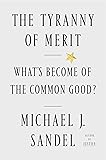
The Tyranny of Merit

“The fortunate [person] is seldom satisfied with the fact of being fortunate,” Max Weber observed. “Beyond this, he needs to know that he has a right to his good fortune. He wants to be convinced that he ‘deserves’ it, and above all, that he deserves it in comparison with others. He wishes to be allowed the belief that the less fortunate also
... See moreMichael J. Sandel • The Tyranny of Merit
do the successful earn and therefore deserve their success, or is prosperity due to factors beyond our control?
Michael J. Sandel • The Tyranny of Merit
do the chosen earn and therefore deserve their election, or is salvation a gift of grace beyond our control?
Michael J. Sandel • The Tyranny of Merit
Is this still an effective debate today?
Weber glimpses what I would call an early version of meritocratic hubris. “The consciousness of divine grace of the elect and holy was accompanied by an attitude toward the sin of one’s neighbor, not of sympathetic understanding based on consciousness of one’s own weakness, but of hatred and contempt for him as an enemy of God bearing the signs of
... See moreMichael J. Sandel • The Tyranny of Merit
Two features of the biblical outlook offer an intimation of contemporary meritocracy. One is its emphasis on human agency; the other is its harshness toward those who suffer misfortune.
Michael J. Sandel • The Tyranny of Merit
When exactly did merit turn toxic, and how?
Michael J. Sandel • The Tyranny of Merit
But this misunderstands the populist complaint.
Michael J. Sandel • The Tyranny of Merit
think the problem with market-driven globalization is simply a matter of distributive justice;
Michael J. Sandel • The Tyranny of Merit
Mainstream parties and elites